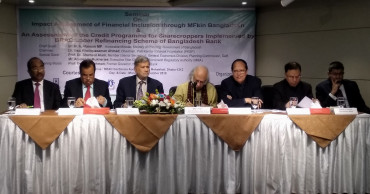foreign debt
Young leaders call for an end to mega projects and foreign debt
Young leaders have urged the government to stop the use of public funds in mega projects under the guise of development and to free the country from the burden of foreign loans.
They highlighted the importance of engaging the general public, particularly young leaders, in creating people-centered financial planning as part of the government's financial strategies.
This was discussed at an event titled "Thoughts of Young Leadership", which contributed to the development of the Public Financial Management Reform Strategy 2025-2030, according to a media release.
The Strengthening Public Financial Management Program for Service Delivery (SPFMS), organized by the Finance Division of the Ministry of Finance and supported by the World Bank, held a workshop this morning at the Intercontinental Hotel in Dhaka, attended by approximately 60 young leaders.
The Young Activists Summit announces its lineup of 2024 Laureates
The event was chaired by Dr. Mohammad Khairuzzaman Mojumder, Secretary of the Finance Division, and featured special guests including Mohammad Saiful Islam, Secretary of the Energy and Mineral Resources Division, and Md. Rezaul Makhsud Jahedi, Secretary of the Ministry of Youth and Sports.
Suraiya Jannat, Lead Governance Specialist and Task Team Leader at the World Bank in Dhaka, presented on the topic “Future Government: From Government of the Past to the Government of the Future.”
Sami Mohammad, a student of the Department of Economics, Dhaka University, highlighted the “Thoughts of Young Leaders” on government financial management reform during the event, which was conducted by Bilquis Jahan Rimi, Additional Secretary (Budget-1) and National Program Director of SPFMS.
The young speakers called for the inclusion of “pre-budget discussions” in the strategic documents for sustainable and people-friendly financial reforms.
They advised significant reforms in the conventional methods of tax collection and suggested, if necessary, to avoid the traditional year-end tax collection methods in favor of daily or weekly collection.
A nation prospers only when its young people thrive: Chinese Ambassador Yao Wen
In his remarks, Dr. Khairuzzaman Mojumder stated that the Government Financial Management Reform Strategy 2025-2030 would be formulated in light of the hopes and aspirations of the younger generation.
Mohammad Saiful Islam emphasized that if financial reforms consider what the new generation wants and how they envision building the country, it would be possible to address various existing challenges in the financial sector.
Youth and Sports Secretary Md. Rezaul Makhsud Jahedi announced that the Ministry of Youth and Sports is taking the initiative to launch a skills development training project to support the families of the martyrs and injured from the July movement.
The Finance Division has initiated the development of the Third Government Financial Management Reform Strategy 2025-2030 with support from the World Bank. Global Affairs Canada and the European Union are providing financial assistance for this program. Previously, the government formulated and implemented two financial management reform strategies for the periods 2007-2012 and 2016-2021.
The participation of stakeholders in the PFM reform strategy is a crucial initiative that plays an important role in making financial management sustainable, transparent, accountable, and effective.
Hundreds of young activists demand in climate finance to fill the loss and damage funding
A strong PFM system's foundation lies in enhancing asset management efficiency and delivering quality services.
Additionally, it involves introducing medium-term budgeting and macroeconomic forecasting, along with the digitization of public financial management through e-systems like IBAS++ (Integrated Budget and Accounting System), automation of national savings schemes, modernization of pensions, and reforms in the management of state-owned enterprises.
1 year ago
Bangladesh’s foreign debt flow down by 24.38% in July-Aug: ERD report
The foreign debt flow to Bangladesh has decreased by 24.38 percent – to USD 86.43 crore – in July-August of the current fiscal year (FY), compared to the previous FY.
The latest report of Economic Relation Division (ERD) revealed that Bangladesh received USD 86.43 crore in the first two months (July-August) of the current fiscal year, which was USD 1.14 billion in the same period last fiscal year. It shows a decrease of 24.38 percent in foreign credit.
The fiscal year 2022-23 started with a jump in foreign credit flow in continuation of the last financial year. In July, the first month of FY 2022-23, nearly USD 49 crore in foreign debt came into the country which was 48.50 percent more than July last year.
But, in August it stumbled. Donors have written off USD 37.63 crore credits this month, which is about 23 percent less than the previous month.
Bangladesh set a record in receiving low-interest foreign loans in FY 22 in the global situation that was turned upside down by the shock of the Russia-Ukraine war after pandemic. Donors waived more than USD 10 billion in foreign credits in FY 22.
Also read: A roadmap needed for debt repayment of 20 mega projects: Debapriya
The ERD, a wing of the Finance Ministry, released data on foreign credit waivers on Thursday, showing that USD 86.43 crore was received from donors in the first two months (July-August) of FY 23. Of them, project aid came to USD 83.29 crore. And the donation received is USD 3.14 crore.
During the same period last year, project assistance was USD 1.10 billion. Grants came in at USD 3.42 crore.
Bangladesh’s foreign credit continues to increase from the fiscal year 2017-18. In the same year, the foreign credit increased from USD 3 billion to USD 6.37 billion in one jump. Then in FY 2018-19, the debt was USD 6.54 billion.
Also read: Bangladesh well-placed among Asian nations in terms of foreign debt: LGRD Minister
3 years ago
TIB urges govt to spare people the burden of foreign debt
Transparency International Bangladesh (TIB) has suggested the government to prevent tax evasion and money laundering by adopting 'Common Reporting Standard (CRS)' to stabilise foreign exchange reserves without burdening the people with foreign debt.
Taking loan from the International Monetary Fund (IMF) and other international institutions is considered normal for stabilising foreign exchange reserves, the graft watchdog body said in a statement on Tuesday.
But the public has to bear the entire burden of repaying such loans along with the interest, it added.
TIB Executive Director Iftekharuzzaman said, "Our question is - to deal with the financial crisis, especially the growing shortage of foreign currency, foreign loan assistance and other ongoing initiatives have been taken with the highest priority of public interest or not! In other words, without increasing the burden of debt on the people, is there an alternative way to be considered?”
In this context, TIB suggested that there is a way open for the government to earn many times more money than the proposed foreign loan annually and sustainably by preventing tax evasion and money laundering at almost no cost.
According to data from Global Financial Integrity, the amount of money laundered through invoice fraud during the 2008-2015 was $8.2 billion annually, which would already be at least $12 billion if data were available to be updated.
Read: CEC’s statement on election-time violence suicidal: TIB
Iftekharuzzaman said, "Growing money laundering is a huge challenge for Bangladesh."
The bulk of money laundering in Bangladesh is organised through misinvoicing or invoice fraud in the import and export trade. As a result, there is massive tax evasion.
It is a legal and moral responsibility for the government to adopt an effective CRS to prevent the large-scale money laundering as well as increase revenue collection, reads the statement.
And it will be helpful in increasing the foreign exchange and national income in a cheap and sustainable manner at a rate many times higher than the one-time proposed international loan of the IMF.
The countries where money is laundered from Bangladesh, even the so-called tax-haven countries or regions are already listed in CRS and are exchanging information, said Dr Zaman.
TIB urged the government to set an example of political will to adopt CRS to tackle the financial crisis in the short term and control tax evasion and money laundering sustainably in the medium and long term.
"We hope that the government will take necessary legal reforms at the national level in addition to the necessary international steps immediately," he added.
More than 120 countries of the world, including many neighboring countries of Bangladesh, are monitoring all types of banking and financial transaction information of citizens located in the country and outside the country automatically through the CRS, which is an initiative of the OECD formed in 2014 and has been effective since 2017.
CRS has helped countries in controlling tax evasion and revenue collection at home and abroad on the one hand and ensuring accountability including preventing, identifying and recovering the laundered money through the exchange of information.
3 years ago
Bangladesh’s foreign debt far below risk limit: Economic review tells PM
Bangladesh’s economy is relatively stable in almost all the indicators and its amount of foreign debt is still far below the risk limit.
This observation came when Prime Minister Sheikh Hasina on Tuesday witnessed a presentation over offshore tax amnesty and macroeconomic review of Bangladesh in the backdrop of Sri Lankan economic crisis.
Also read: PM laments absence of strong opposition
The National Board of Revenue (NBR) and the Finance Division made the presentation at a meeting in Ganobhaban here, said a press release of the PMO press wing.
The cause of the ongoing crisis in Sri Lanka and its impacts were discussed in detail. Various indicators of Bangladesh's economy are reviewed in comparison to those of other countries in South Asia.
“It was observed that the economy of Bangladesh is relatively stable in almost all the indicators,” said the release.
3 years ago
Bangladesh wants to end foreign debt
Planning Minister MA Mannan on Monday said Bangladesh is trying to come out of the cycle of debt caused by loans from foreign entities, particularly the World Bank (WB).
6 years ago







